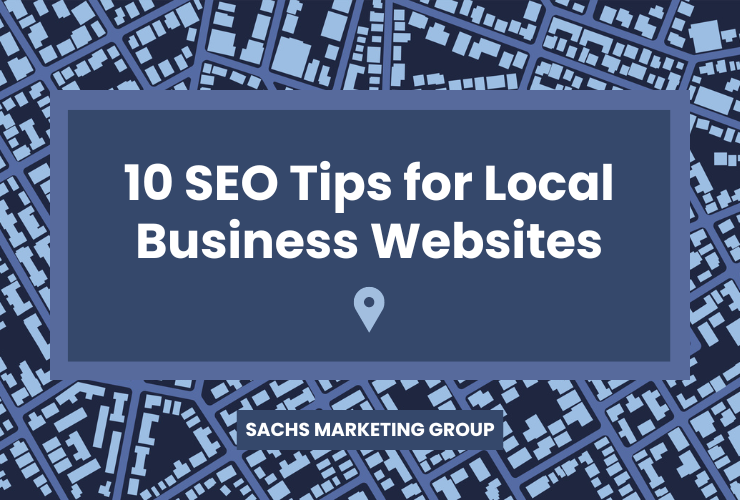Want to increase the visibility of your local business website so it appears when people search for keywords from a certain location?
Local businesses often struggle to make their presence felt in the online space. The competition is fierce, and without an optimized online presence, it’s hard to be noticed by potential customers. The absence of local search engine optimization (SEO) means you are missing out on a huge chunk of the audience that searches for local products or services. This results in lost sales opportunities and diminished brand visibility.
Think about how many times you’ve searched for a service or product near you. The Internet is the go-to place for consumers to find local businesses. Without local SEO, your competitors who have optimized their websites are taking away all the potential customers. Even if your services are superior, the lack of online visibility means potential clients will not even know your business exists. This not only affects your current revenue but over time it can have a drastic effect on your business’s growth and sustainability.
Local SEO is the key to solving these issues. By optimizing your website for local keywords, you can effectively boost your visibility so people who are looking for your services can easily find you.
To help you get started, we’re exploring what local SEO is, the local ranking factors involved, and ten SEO tips for local business websites.
Overview
What is Local SEO?
Local SEO, or Local Search Engine Optimization, is a type of SEO that aims at optimizing a website to be found in local search results.
Local search results include the search queries that have a local intent, such as “plumber near me” or “coffee shops in [city name]”. By optimizing your website for local SEO, you can connect with potential customers who are looking for the services or products you offer in your area. This is particularly vital for brick-and-mortar stores and businesses that serve a specific locality.
There are many reasons why local SEO is important for small businesses, but perhaps the biggest reason is it helps position your website in front of potential customers.
Local Ranking Factors
For a website to appear in local search results, Google considers several local ranking factors. The three primary ranking factors are Relevance, Proximity, and Prominence.
Relevance: Relevance determines how well your business fits the search query of the user. Ensuring that your website content, Google Business Profile, and other online information accurately reflects your business offerings is key.
Proximity: Proximity is about how close your business is to the searcher’s location. Google uses the user’s location data to show businesses and services nearby. Hence, it’s essential to ensure that your business’s address and location information are correct.
Prominence: Prominence refers to how well-known your business is. Reviews, mentions in local news sources, and other factors contribute to this. A business that is talked about a lot online is likely to be a prominent local business.
Related: How Long Does it Take to Rank on Google?
SEO Tips for Local Business
Navigating the world of local SEO can be a game-changer for your business.
In this section, we will delve into ten indispensable SEO tips that will put your local business on the map and help you outshine the competition.
1. Create a Google Business Profile
Establishing an online presence is crucial, and creating a Google Business Profile is one of the most effective ways to achieve this for local businesses. This not only increases your visibility on Google Search and Maps but also lets customers find important information about your business quickly.
Here are the steps to create a Google Business Profile:
- Claim Your Google Business Profile Listing: Open Google Maps and search for your business name or address. Claim your listing if it already exists. If not, create a new one.
- Fill in Your Information: Provide essential details such as your business name, address, phone number, and category.
- Verify Your Business: Google will need to verify that your business is legitimate. Typically, this is done through a postcard sent to your business address with a verification code.
- Add Business Hours: Make sure to add your operating hours, and keep them updated if they change.
- Add Photos: Upload high-quality photos of your business, products, or services. This helps to attract customers and give them a visual idea of what to expect.
- Add a Business Description: Write a concise and informative description of what your business offers. Include local keywords naturally to improve SEO.
- Manage and Respond to Reviews: Actively manage your Google Business Profile by responding to customer reviews and engaging with them. This shows that you value customer feedback.
- Add Posts and Updates: Regularly add posts about new products, promotions, or events. This will keep your profile active and engaging.
- Use Insights: Google provides insights on how customers search for your business, and how they interact with your listing. Use this data to optimize your profile.
By creating and optimizing your Google Business Profile, you’ll not only increase your local visibility but also provide potential customers with the information they need to choose your business.
2. Add Your Business to Local Business Directories (NAP)
Adding your business to local business directories, like Yelp, Bing Places, and The BBB, is a powerful way to improve your online presence and, in turn, attract more customers. These directories act as online versions of the yellow pages, where people go to find services or products. Being listed on multiple platforms can amplify your reach and improve your local SEO.
One critical aspect to focus on while listing your business is maintaining consistent NAP – Name, Address, and Phone Number across all directories. Consistent NAP information is crucial for several reasons:
- Enhances Search Engine Trust: When search engines find the same information about your business across multiple reputable directories, it increases their trust in your business, which can result in higher rankings.
- Improves Customer Experience: Having consistent NAP ensures that regardless of where potential customers find your business online, they will have the correct information to contact you or visit your physical location.
- Avoids Confusion: Inconsistent NAP information can lead to confusion, causing potential customers to lose faith in the legitimacy and professionalism of your business.
3. Encourage Your Customers to Write a Review
One of the most effective ways to improve your local SEO and build trust with potential customers is by encouraging your existing customers to write reviews. Online reviews play a crucial role in shaping consumer perception and influencing buying decisions.
Reviews help build trust, which is one of the most important qualities Google looks for when ranking websites.
So, how can you get customers to post a review about your business?
Here are a few ideas:
- Ask in Person: Sometimes, the most straightforward approach is the best. If you have a brick-and-mortar store, ask customers in person as they are completing their purchase.
- Follow-up Emails: After a purchase, send a follow-up email thanking the customer for their business and kindly ask for a review.
- Incentives: Provide an incentive such as a discount or entry into a contest in exchange for a review.
- Leverage Social Media: Encourage your followers to leave reviews, and be sure to thank them when they do.
- Make it Easy: Provide direct links to your review profiles in your email signatures, newsletters, and on your website.
Remember to always thank customers for their reviews, regardless of whether they are positive or negative, and address any issues raised by customers in a professional manner. Encouraging and managing customer reviews is an ongoing process that can lead to improved customer satisfaction, higher local search rankings, and ultimately more business.
4. Identify Local Keywords
To optimize your local SEO efforts, identifying and using local keywords is paramount. Local keywords are search terms that include location-specific phrases. For example, instead of just targeting “best breakfast burritos,” a local Mexican restaurant would target “best breakfast burritos in Los Angeles.” This allows your business to capture the attention of people searching specifically in your area.
Local keywords are important because they help you reach people in your area – the people who are more likely to contact you and become your customer.
How do you identify local keywords?
- Brainstorm: Think about what your potential customers might search for. Include your city, neighborhood, or other local identifiers.
- Use Keyword research tools: Utilize keyword research tools such as Google Keyword Planner, Semrush, or Ahrefs to find popular local search terms.
- Analyze Competitors: Look at what local keywords your competitors are using.
5. Create Location Pages on Your Website
If your business operates in multiple locations, it’s essential to create distinct pages for each of these locations. This is vital for local SEO as it helps search engines and users find relevant information based on geography.
What to Include on Location Pages:
- Name, Address, Phone Number (NAP): Ensure that your business information is consistent with what is listed on your Google Business Profile listing and other directories.
- Business Hours: Clearly state the opening and closing times for each location.
- Services or Products: Explain what services or products are offered at this specific location.
- Google Maps: Embed Google Maps with your business location marked.
- Local Content: Include content specific to the location such as the team members who work at that location, local reviews, etc.
6. Create Content About Local Events and News
Engaging with your local community by creating content about local events and news can significantly boost your local SEO efforts.
Local content is super-important for local SEO, as it demonstrates you’re active in the local community. This is what Google is looking for when ranking local websites – it wants to make sure it’s ranking a company that actually exists in the area.
So, what is local content anyway and how can you create it?
Here are a few ideas to help you get started:
- Event Coverage: Write blog posts covering local events, whether you are participating or just informing your audience about them.
- Local Partnerships: Partner with local non-profits or other organizations and create content that highlights your partnership.
- Community Activities: If your business participates in community service or local meetups, create content that showcases this involvement.
- Local Guides: Create guides that are valuable to the local community and relevant to your business. For instance, a wedding planner might create a guide titled “Top 10 wedding locations in Westlake Village.”
Remember to promote your local content on social media and other platforms to increase its reach within the local community. Additionally, this kind of content helps in building your brand’s image as a community-focused business, which can foster loyalty among local customers.
7. Optimize for Voice Search
Voice search is a technology that allows users to perform searches on the internet by verbally issuing commands to a smartphone, smart device, or computer. Instead of typing queries into a search bar, users can simply speak their queries and receive spoken or text-based search results.
With the rising popularity of voice assistants, optimizing for voice search is becoming increasingly important.
- Long-tail keywords: Focus on long-tail keywords and create content that directly answers common questions.
- Use Natural Language: Voice searches are typically more conversational. Use natural language and long-tail keywords.
- Answer Questions: Many voice searches are phrased as questions. Create content that provides direct answers.
- Improve Site Speed: Voice search users expect quick results. Ensure your site loads quickly.
- Use Structured Data: Help search engines understand your content better by using schema markup.
8. Build High-quality Backlinks from Local Websites
Building high-quality backlinks from local websites is a strategy that involves obtaining inbound links from reputable sources within your community.
This not only strengthens your local SEO but also establishes your business as an authority in the local market, which can drive more traffic and improve your online presence.
Here’s how to get started:
- Engage with Local Bloggers: Reach out to local bloggers and offer to write guest posts.
- Sponsor Local Events: Often, sponsoring local events can result in a backlink from the event’s website.
- Join Local Business Associations: These organizations often have directories where you can list your business and gain a backlink.
- Create Shareable Local Content: Create content that local websites would want to link to.
Related: 10 Benefits of Ongoing SEO Services
9. Optimize Your Website for Mobile
More than half of online traffic comes from mobile devices. Optimizing your website for mobile is a critical component of any local SEO strategy.
As more people rely on their smartphones to search for products and services, a mobile-friendly website ensures that visitors have a seamless experience, irrespective of the device they use. Google, too, prioritizes mobile-optimized websites in its search rankings, especially after the implementation of mobile-first indexing.
Having a mobile-responsive site also helps in reducing bounce rates and enhances user engagement, as the content adjusts according to different screen sizes, making navigation and interaction easier and more intuitive for users.
Here’s how to optimize your website for mobile visitors:
- Responsive Design: Ensure your website scales properly on various screen sizes.
- Improve Load Times: Optimize images and enable compression to reduce load times.
- Simplify Navigation: Make it easy for mobile users to navigate your site.
10. Stay Active on Social Media
Staying active on social media is an essential element for local businesses looking to boost their online presence and engage with their community. Social media platforms like Facebook, Twitter, Instagram, and LinkedIn offer businesses the opportunity to connect with customers on a more personal level. By sharing updates, promotions, and valuable content, you can build relationships that encourage customer loyalty and word-of-mouth referrals.
- Choose Relevant Social Media Platforms: Focus on platforms where your target audience is most active. Common social media platforms include Facebook, Twitter, Instagram, LinkedIn, and Pinterest. For example, if your business is visually-oriented, like a bakery or clothing store, Instagram is a good choice.
- Create a Posting Schedule: Consistency is key. Create a social media calendar and schedule your posts in advance. This ensures that your audience receives regular updates and stays engaged with your brand.
- Engage with Your Audience: Respond to comments and messages, and actively participate in conversations. This can build trust and create a loyal customer base.
- Share Local Content: Post about local news, events, or anything community-related. This shows your involvement in the community and can attract a local audience.
- Use Local Hashtags: Utilize hashtags that are popular in your local area. This will help your posts reach a larger local audience who might be interested in your products or services.
- Encourage Customer Interaction: Encourage your customers to tag your business or use a branded hashtag. Share customer posts (with permission) on your social media.
- Promote Offers and Deals: Announce special promotions, offers, or events through social media to entice your local customers to visit your store or website.
- Utilize Social Media Advertising: Use geotargeted ads to reach potential customers in a specific location.
- Share Testimonials and Reviews: Sharing positive reviews and testimonials can build trust among your local community.
By combining these strategies, staying active on social media can significantly benefit your local business. It’s not just about selling but creating relationships with your customers. Engage genuinely, provide value, and be a part of the community, and you’ll find that social media can be a powerful tool in improving your local reach and building a loyal customer base.
FAQs
How to do local SEO for small businesses?
Start by claiming your Google Business Profile listing and ensuring that your NAP (Name, Address, Phone number) information is consistent across all platforms. Focus on collecting customer reviews, optimizing for local keywords, creating location-specific pages on your website, and engaging with the local community through social media and content.
Is SEO worth it for local businesses?
Yes, SEO is absolutely worth it for local businesses. By optimizing for local search, businesses can connect with more customers in their area, build brand awareness, and ultimately increase sales and revenue.
How do I optimize local listings?
Optimize local listings by claiming your business on various directories, ensuring NAP consistency, adding relevant categories, including high-quality photos, and encouraging customer reviews. Keep the information updated and engage with customers who leave reviews.
What are the three ranking factors for local SEO?
The three primary ranking factors for local SEO are Relevance, Proximity, and Prominence. Relevance is how well your business matches a search query, Proximity is how close your business is to the searcher, and Prominence refers to how well-known your business is in the area.
How do I get my local business on top of Google?
To get your local business on top of Google, focus on optimizing your Google Business Profile, building local citations, generating positive reviews, using local keywords, creating valuable content, and earning high-quality backlinks from reputable local sources.
What is an example of a local SEO?
An example of local SEO is when a dental clinic optimizes its website and online listings for keywords such as “dentist in [city name]” or “teeth cleaning near me”, and includes the clinic’s address, phone number, and customer reviews to rank in local search results.
Partner with a Local SEO Company
If you are overwhelmed by the idea of handling local SEO on top of everything else, consider partnering with Sachs Marketing Group.
Our team of SEO experts handles a variety of SEO services, including local SEO. By partnering with Sachs Marketing Group, you’ll gain access to a wealth of knowledge and tools that can propel your website to the top of local search results. Imagine your business being the first thing potential customers see when they search for the services you offer.
Think about how your revenue could skyrocket when local customers can easily find you online. No more wasted efforts – only targeted strategies that bring results. With more visibility comes more traffic, and with more traffic, your chances of converting visitors into loyal customers dramatically increase. The growth and sustainability of your business become attainable goals. All of this can be achieved with our cutting-edge Local SEO services tailored specifically for your business.
Take the reins of your business’s online presence today. Contact Sachs Marketing Group to learn how our Local SEO services can be the catalyst for your business’s growth in the local market. Let’s work together to build a strong online foundation for your business.
Conclusion
Local SEO is crucial for businesses looking to tap into the local market. With the proper utilization of Google Business Profile, NAP consistency, local keywords, content creation, and customer engagement, you can enhance your local presence.
Don’t underestimate the power of reviews and backlinks, and remember to optimize your website for mobile and voice search. Partnering with an SEO company can also be a valuable investment to guide you through this process. By employing these SEO tips for local businesses, you’ll be on your way to securing a prominent position in local search results and expanding your customer base.
Contact us today to get the conversation started!














